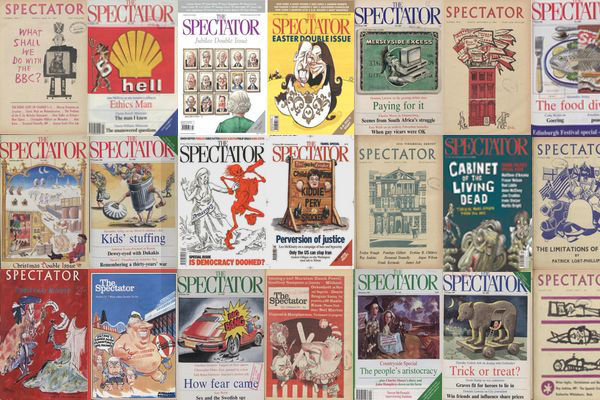Caution over wind
Sir: While the broadcast media have assailed their audiences with simplistic yet blanket coverage of the floods crisis, it behoves Christopher Booker to provide a long overdue critical perspective of the Environmental Agency (‘Sunk!’, 15 February). The two main tenets of his article have been ignored by most, if not all, other journalists.
With something approaching delicious irony we are then treated in the same issue to a self-serving missive from the Renewables UK boxwallah Jennifer Weber (Letters, 15 February). Replete (as one would expect from an organisation that previously went under the name British Wind Energy Association) with dismissive assertions and bogus statistics, Weber’s letter exemplifies the absolute intolerance that green ideologues show to any legitimate criticism that runs counter to their orthodoxy.
To say that ‘two thirds of the public support the deployment of wind energy’ is risible, when study after study has demonstrated the financial and practical unsuitability of such alternative sources of energy. It was no surprise that those bastions of impartiality the BBC and the RSPB were name-checked as witnesses to support her assertions.
Alexander McKibbin
Ringwood, Hants
Scots in the Great War
Sir: Charles Moore states in his Notes (8 February) that ‘by the end of the Great War, 1,157 Etonians had died, the largest number lost by any school in the British Empire’. Raasay lies between Skye and Wester Ross; the 1891 census gives 489 inhabitants, diminished to 377 by 1931. When I visited the island a few years ago I noted that, of 26 men who went to the Great War, only eight returned. I am well aware that members of the upper class died disproportionately in the Great War and do not wish to get into arguments as to whether Mr Moore is talking about absolute or relative numbers for any particular school. His piece reminded me, however, of the huge discrepancy between fatalities from England and Scotland in the Great War: nine out of ten English soldiers returned from the Great War, only three out of four Scots. Or to put it another way, fatalities from England ran at ‘only’ 40 per cent of those from Scotland. Subsequent reading and conversations with professional historians have generally confirmed these figures.The obvious explanation for this is that the Scots were poorer soldiers than their southern brethren. But I feel it may not be that simple. Maybe one of your learned contributors could shed some light on this?
Sinclair C. Dunnett
Inverness
2,500 cows to a zeppelin
Sir: Charles Moore requests startling facts about the first world war. I offer the following: according to the Telegraph, it took 2,500 cows to help build one zeppelin. Their intestines were used as ‘gasbags’.
Stella Barrow
Piddlehinton, Dorset
Don’t be childish
Sir: Thanks to Mark Palmer for his crusade against upspeak (‘It has to stop?’, 15 February). Would that a similar stand were taken against the increasingly prevalent ‘little girl voice’. Radio 3, so often castigated for its dumbing down, is especially prone to women with this tendency, and it makes certain announcers totally unbearable. Is it an effect of the modern adulation of childhood? Do intelligent women think a prepubescent voice will make them seem less threatening to men?
Cornelia Starks
Moreton-in-Marsh, Gloucestershire
Anti-Russian propaganda
Sir: Taki is spot on about Russia and the attitude of the ‘western’ media towards the great country and its president (High life, 15 February). The portraying of Russia and Putin by the mass media scarily reminds me of the Stalinist anti-West propaganda in the countries of the Soviet block. The same kind of lies, distortions, exaggerations, offensive jargon and absolutely uniform one-sidedness. It is as if the same people were writing the scripts. As one of the reasons for this state of affairs, Taki rightly mentions Russia’s gradual return to Christianity after the three-generation period of morally devastating religious suppression. This obviously infuriates the ubiquitous atheistic bigots.
Andrzej Wilski
Warsaw, Poland
The Scots will decide
Sir: It may be obvious to Nick Hudd (Letters, 15 February) that the Scottish independence question should be put to referenda in all four constituent parts of the UK. But in so asserting he misses a much more obvious point: namely, that one of the central lessons of British history from 1776 onwards is that trying to force peoples to remain yoked to London when they do not wish to be so isn’t worth the candle.
Harold Macmillan acknowledged the point in his ‘Winds of Change’ speech; David Cameron, to his credit, acknowledged it in the Edinburgh Agreement. What it means is that if, as I think they will, the Scots decide to take their leave of the UK, then what the other peoples of these islands think of their decision is irrelevant.
Keith Aitken
Edinburgh
Rule Britannia
Sir: Charles Moore (Notes, 15 February) despairs of finding a suitable name for what will be left if the Scots decide to leave the UK. What’s wrong with Britannia? If it was good enough for the Romans it ought to be good enough for us. It would also be the perfect excuse for replacing our current national anthem with Thomas Arne’s considerably more rousing version.
Giles Vicat
Bucknell, Oxfordshire
Got something to add? Join the discussion and comment below.
Get 10 issues for just $10
Subscribe to The Spectator Australia today for the next 10 magazine issues, plus full online access, for just $10.
You might disagree with half of it, but you’ll enjoy reading all of it. Try your first month for free, then just $2 a week for the remainder of your first year.













Comments
Don't miss out
Join the conversation with other Spectator Australia readers. Subscribe to leave a comment.
SUBSCRIBEAlready a subscriber? Log in